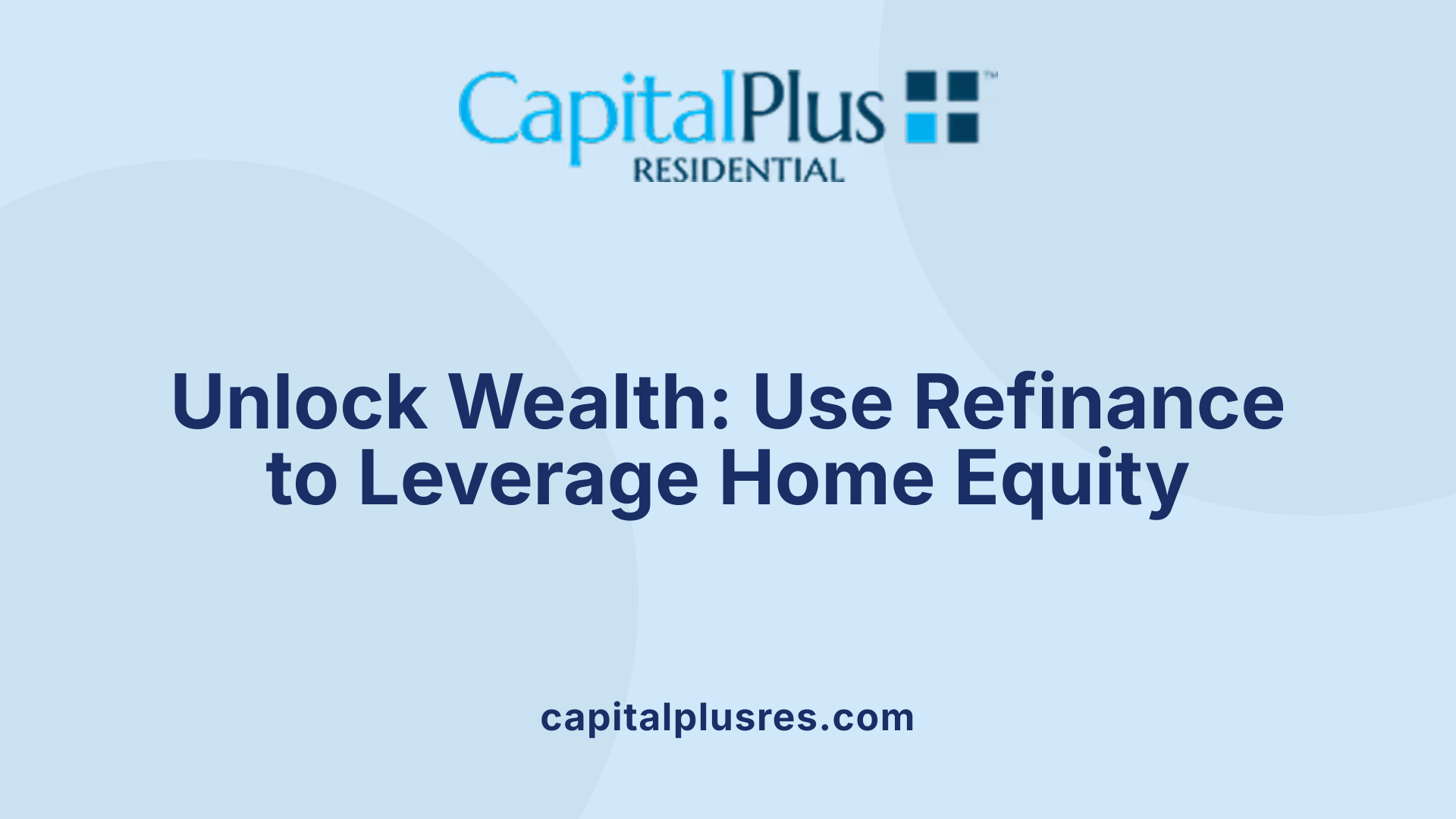Harnessing the Power of Mortgages in Your Wealth Journey
Mortgages are often seen as mere tools for purchasing a home, but for high-net-worth individuals and savvy investors, they represent a strategic lever to build and enhance wealth. This article delves into how leveraging various mortgage options and planning techniques can optimize cash flow, maximize investments, and align with broader financial goals. From innovative loan products to tax considerations, discover how making informed mortgage decisions can be a cornerstone of long-term financial success.
Understanding Mortgage Types and Their Role in Wealth Building
What Are the Different Types of Mortgages?
Mortgages come in various forms, each designed to meet different financial needs and strategies. The most common types include:
- Fixed-Rate Mortgages: Offer a stable interest rate and consistent monthly payments, providing predictability in budgeting.
- Adjustable-Rate Mortgages (ARMs): Feature interest rates that can change over time, often starting lower than fixed rates, which might benefit those expecting income growth or planning to refinance.
- Interest-Only Loans: Allow borrowers to pay only the interest for an initial period, minimizing payments early on.
- Balloon Mortgages: Require smaller payments initially with a large lump-sum payment at the end of the term.
How Does Mortgage Selection Align With Wealth-Building Goals?
Choosing the right mortgage type should align with an individual's broader financial objectives. For high-income families, a strategic approach can optimize cash flow, reduce interest costs, and leverage home equity for investment opportunities. For example, fixed-rate loans suit those seeking payment stability, while ARMs or balloon loans might appeal to investors anticipating higher future earnings or refinancing opportunities.
How Can Selecting the Right Type of Mortgage Help in Wealth Building?
Opting for an interest-only loan can significantly improve cash flow by lowering monthly payments during the interest-only period. This freed-up capital can then be redirected toward other investments, such as stocks, real estate, or business ventures, which may generate higher returns. This strategy allows borrowers to grow their wealth more efficiently without immediately increasing their debt burden.
By understanding these mortgage types and carefully selecting one that matches financial plans, borrowers can use mortgages not just as a means to buy a home but as powerful tools for building long-term wealth.
Leveraging Home Equity Through Refinancing

How does refinancing help in leveraging home equity for further investments?
Refinancing your mortgage allows homeowners to tap into the increased equity built up in their property. By opting for cash-out refinancing, you can borrow against your home's value and receive a lump sum of cash. This capital can be used to fund other investments, such as purchasing additional real estate, investing in stocks, or expanding business ventures, accelerating overall wealth accumulation.
Traditional cash-out refinancing benefits
Cash-out refinancing not only provides liquidity but can also offer improved loan terms, such as lower interest rates or longer repayment periods, compared to other borrowing options. This makes it a cost-effective method to access funds without selling your home or other investments.
Timing refinancing to optimize wealth growth
Strategically timing when you refinance is crucial. Refinancing when interest rates are low or after your home has appreciated in value maximizes the equity you can access and minimizes borrowing costs. Monitoring market conditions and home values with the help of financial advisors ensures you refinance under the most favorable terms, enhancing your wealth-building potential.
Specialized Mortgage Products for High-Net-Worth Individuals
What unique mortgage products are available to high-net-worth individuals to support wealth building?
High-net-worth individuals (HNWIs) have access to several specialized mortgage products designed to align with their wealth-building strategies while offering flexibility beyond conventional loans.
Asset Depletion Mortgages convert significant liquid assets into qualifying income, enabling borrowers to secure home loans without needing to sell these assets. This product is ideal for individuals with substantial investments but limited traditional income streams.
Crypto-Backed Mortgages allow digital asset investors to leverage cryptocurrencies like Bitcoin as collateral. This approach permits maintaining cryptocurrency holdings while accessing mortgage financing, thus preserving investment growth and liquidity.
DSCR (Debt Service Coverage Ratio) Loans cater to real estate investors who generate income from rental properties. Approval is based on property cash flow rather than personal income, facilitating portfolio expansion without the constraints of typical income verification.
These tailored mortgage options provide HNWIs with strategic tools to optimize cash flow, maintain asset positions, and grow their wealth effectively through real estate and investment financing.
Financing Investment and Second Homes Strategically

What should investors know about financing second homes and vacation properties?
Financing second homes and vacation properties presents unique challenges compared to primary residences. Lenders typically enforce stricter qualification criteria, such as higher credit scores and larger down payments, reflecting the increased risk. Borrowers can access various loan types, including conventional loans for standard buyers and jumbo loans tailored for high-value properties that exceed conventional loan limits.
Challenges in second-home and vacation property financing
Post-pandemic market shifts have increased the complexity and cost of securing loans for these properties. Higher interest rates and tighter lending standards mean prospective buyers must carefully plan their financing strategies. These challenges necessitate exploring beyond traditional mortgages to find flexible solutions.
Conventional and jumbo loans usage
Conventional loans remain popular for financing second homes that fall within loan limits, offering competitive rates and terms. Jumbo loans become essential for luxury vacation homes or properties in high-cost markets, accommodating larger loan amounts but often requiring more stringent financial documentation and qualifications.
Impact of recent market changes post-pandemic
The COVID-19 pandemic significantly altered lending landscapes. Costs associated with purchasing secondary properties rose, and lenders adjusted guidelines, prompting buyers to reconsider their financing approaches. This environment encourages exploring alternative lending options to maintain affordability and seize market opportunities.
Creative solutions like bridge loans
Creative financing methods, such as bridge loans, provide temporary funding that can bridge the gap between selling a current property and buying a new vacation home. Additionally, leveraging home equity through lines of credit or cash-out refinances offers flexibility for funding investment in desirable second-home locations.
By understanding these evolving financing tools and market conditions, investors can optimize their strategies for acquiring second homes and vacation properties, complementing their broader wealth-building objectives.
Tax Advantages in Mortgage Strategies for Wealth Building

Mortgage interest tax deductibility
Mortgage interest paid on a primary residence can be tax-deductible within limits set by law. This deduction effectively lowers the homeowner's taxable income, resulting in reduced tax liability. For high-income families, this translates into improved cash flow, freeing up capital for further investments. Taking advantage of mortgage interest deductions is a common strategy to enhance financial efficiency while holding onto valuable real estate assets.
Principal residence exclusion rule
When selling a primary residence that meets certain ownership and use criteria, homeowners can exclude up to $250,000 of capital gains from taxable income—or $500,000 if married filing jointly. This exclusion shields a significant portion of the appreciation in home value from capital gains tax, making it a powerful tool in wealth preservation and accumulation. Leveraging this rule allows individuals to convert real estate gains into tax-free proceeds, which can then be reinvested or used to diversify their portfolio.
Tax-efficient leveraging of assets
Beyond direct tax deductions, mortgage strategies enable high-net-worth individuals to leverage various asset classes—such as stocks, cryptocurrencies, and real estate—in a tax-efficient manner. For example, using asset depletion or crypto-backed mortgages allows owners to convert holdings into qualifying income without liquidating investments, avoiding capital gains taxes. By structuring debt alongside assets strategically, investors maintain portfolio growth potential while optimizing balance sheets for long-term wealth creation.
How do tax considerations influence mortgage-based wealth strategies?
Mortgage interest deductibility reduces tax burdens on homeowners, increasing available capital for investments. The principal residence exclusion enables tax-free gains realization on home sales, protecting accumulated wealth. Additionally, leveraging assets through specialized mortgage products, such as crypto-backed or asset depletion loans, preserves investment value and defers tax events. Together, these tax considerations shape effective mortgage strategies geared toward building and preserving wealth while managing risk and liquidity.
Optimizing Cash Flow with Advanced Financing Techniques

What advanced financing techniques can optimize cash flow to support wealth accumulation?
One effective way to enhance cash flow is through interest-only loans. These loans allow borrowers, especially high-income families, to minimize their monthly mortgage payments during the initial period. This reduced payment structure frees up capital that can be invested elsewhere, helping to maximize overall wealth.
Mortgage recasting is another valuable tool. It involves making a large principal payment toward the mortgage and then adjusting monthly payments accordingly without going through a complete refinance. This can lower monthly obligations significantly, improving cash flow while retaining the original loan terms.
Making lump sum payments on the mortgage principal also plays a critical role in wealth building. These payments reduce the total interest paid over the life of the loan and accelerate equity accumulation. The increased equity can then be leveraged for additional investments, creating a cycle of financial growth.
Combining these strategies allows borrowers to maintain flexibility, improve liquidity, and create opportunities for further asset growth.
| Financing Technique | How It Works | Financial Benefit |
|---|---|---|
| Interest-Only Loans | Pay only interest for a set period | Frees cash flow for other investments |
| Mortgage Recasting | Large principal payment followed by payment adjustment | Lowers monthly payments without refinancing |
| Lump Sum Payments | Extra principal payments reduce loan balance | Decreases interest and speeds up equity building |
Risk Management and Maintaining Financial Stability
Importance of debt-to-income ratio
Maintaining a debt-to-income (DTI) ratio below 36% is widely recognized as a standard for ensuring financial stability and flexibility. This measure helps high-income families avoid overleveraging and reduces the risk of financial strain if market conditions change or income fluctuates. Keeping DTI within this range allows for smoother mortgage management and better credit health.
Strategic timing and risk alignment
Timing mortgage moves such as refinancing when interest rates drop or home values increase can enhance financial outcomes and reduce risk exposure. Aligning mortgage strategies with long-term wealth goals and personal risk tolerance ensures that borrowing decisions support sustainable wealth growth rather than impulsive financial decisions. This strategic approach promotes resilience against unexpected economic downturns.
Balancing mortgage leverage and financial flexibility
Using mortgage leverage thoughtfully involves balancing benefits of cash flow maximization against the need for liquidity and risk mitigation. Employing tools like mortgage recasting or making lump sum payments can lower monthly debt obligations and reduce interest over time, improving financial flexibility. Proper mortgage selection, such as choosing between fixed-rate or adjustable options, also helps tailor risk levels to personal circumstances.
Incorporating these risk management principles ensures mortgage strategies serve as effective tools for wealth accumulation while preserving financial health. Such careful planning prevents excessive debt burdens and aligns borrowing with broader financial stability and long-term objectives.
The Role of Professional Guidance in Mortgage Wealth Strategies

Working with mortgage brokers
Mortgage brokers play a crucial role in helping high-income families access a wide range of loan options tailored to their unique financial situations. By navigating the market, they can identify specialized products like asset depletion mortgages, crypto-backed loans, or DSCR loans that align with wealth-building goals. Their expertise ensures borrowers find solutions that maximize cash flow and leverage assets effectively.
Importance of financial advisors
Financial advisors provide an essential layer of strategic planning, helping families to align their mortgage decisions with broader financial objectives. They assess risk management, tax implications, and timing—such as refinancing when interest rates drop or home values increase—to optimize mortgage benefits. This guidance supports sustainable wealth growth and prevents costly mistakes.
Customization of strategies for individual goals
Every financial situation is different, and effective mortgage strategies require a personalized approach. High-net-worth individuals benefit from strategies that match their income streams, asset holdings, and investment plans. Whether it’s selecting adjustable-rate or interest-only loans, making lump sum principal payments, or utilizing mortgage recasting, professional advisors tailor recommendations to help clients build wealth efficiently.
Why is professional advice critical when leveraging mortgages for wealth building?
Mortgage brokers and financial planners bring expertise in selecting appropriate loan products and timing transactions to individual financial goals. Their guidance helps navigate complex lending options, optimize tax benefits, and implement wealth-building strategies effectively, especially for high-income families managing diverse assets and investment portfolios.
Leveraging Mortgage Products to Expand Real Estate Portfolios
How can investors use mortgages to expand real estate investment portfolios?
Investors can strategically use mortgage options like DSCR (Debt Service Coverage Ratio) loans to grow their real estate holdings. DSCR loans assess an investment property's ability to generate sufficient rental income to cover mortgage payments, rather than focusing on the borrower's personal income. This makes it easier for investors to qualify for financing based on property cash flow.
DSCR loans for rental income properties
These loans are tailored specifically for income-producing properties. Because the lender evaluates the rental income potential, investors can secure loans to purchase additional rental homes, apartments, or commercial spaces without relying solely on their salary or traditional income documentation.
Using rental income to qualify for financing
By leveraging rental income as qualifying income, investors can take advantage of their property's cash flow to obtain better financing terms. This approach allows for smoother acquisition of multiple properties, enabling portfolio expansion without overextending personal finances.
Portfolio expansion techniques
Beyond DSCR loans, investors often employ strategies like refinancing existing properties to access home equity for further investments. Combining rental income qualification with structured financing plans supports acquiring new properties while managing risk effectively.
These mortgage products and financing methods collectively empower real estate investors to expand their portfolios more efficiently and sustainably.
Timing and Strategic Financing: Keys to Maximizing Wealth
How does timing and strategy in mortgage financing affect wealth-building success?
Effective timing and strategic mortgage planning play a pivotal role in maximizing wealth for high-income families.
One major opportunity lies in refinancing when interest rates drop or when home values increase. This approach can significantly lower borrowing costs and unlock additional equity, which can then be redirected into other investments. For example, a cash-out refinance can provide liquidity without needing to sell assets, maintaining investment growth.
Selecting the right mortgage product—whether it’s an interest-only loan to maximize cash flow, a DSCR loan for rental properties, or an asset depletion mortgage for individuals with low traditional income—allows borrowers to tailor financing to their unique situations. Understanding market conditions and one’s financial goals is essential to choose and time these products effectively.
Strategic mortgage planning also means aligning debt management with long-term goals. Many high-net-worth individuals opt not to rush paying off mortgages but rather leverage them for tax benefits, cash flow, and portfolio expansion. Tools like mortgage recasting or lump sum principal payments offer flexibility to reduce payments or accelerate equity building, both of which can be reinvested for wealth growth.
In summary, by combining astute timing with a broad selection of financing options and aligning these with personal financial objectives and market dynamics, families can significantly improve their wealth-building efficiency and resilience.
Mastering Mortgage Leverage for Lasting Wealth
Strategically leveraging your mortgage is a powerful approach to wealth building that requires careful planning, timing, and professional guidance. By understanding diverse mortgage types, utilizing refinancing options, and embracing innovative loan products, high-net-worth individuals can optimize cash flow, minimize tax burdens, and expand their investment portfolios effectively. Maintaining financial stability through disciplined risk management and aligning mortgage strategies with broader financial goals ensures that borrowing works as a valuable tool—not a burden—on the path to lasting wealth.









